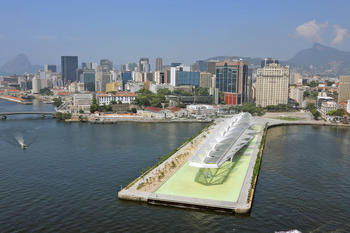Marvelous Value Creation
Sociologist Sérgio Costa and legal sociology scholar Guilherme Leite Gonçalves explored the eventful history of the port of Rio de Janeiro.
Jul 15, 2016
A museum for Rio’s port: The spectacular building by star architect Santiago Calatrava is intended to upgrade one of the city’s poorest areas.
Image Credit: picture alliance
When the Games of the XXXI Olympiad start in Rio de Janeiro, on August 5, Rio’s new port area, “Porto Maravilha,” will be among the areas drawing the world’s attention. Not just because the Olympic flame will burn there among spectacular new buildings such as the Museu do Amanhã after the opening ceremony, not just because the track and field events will be held at the nearby Sambódromo venue, and not just because the port itself will be one of the “live sites” for the Olympics.
The main thing on everyone’s minds will be how Rio is trying to transform itself. Following Barcelona’s example, the city deliberately set out to take the Olympics as an opportunity to breathe new life into a formerly neglected waterfront area. Or, as real estate professionals would say, to “revitalize” it.
The project that emerged from these plans, Porto Maravilha, was approved at the same time that Rio itself won its bid to host the Olympics. It represented a major overhaul in terms of urban development, with plans for new traffic and transportation networks and the demolition of the old urban highway, creation of new infrastructure, and construction of new museums to serve as the area’s hallmarks, including the Museu do Amanhã – the “Museum of Tomorrow,” by Spanish/Swiss star architect Santiago Calatrava. The plans also called for a number of new office and residential high-rise buildings, but most of the latter category fell victim to the recession and the collapse of the local real estate market.
Costa explains that the original goal of the research project was to study forms of capital accumulation since the colonial era and the metamorphoses they have undergone. “It wasn’t long before we realized that Rio’s port is a wonderful object of study because you can observe the different phases of capital accumulation over the past 300 to 400 years, from mercantilism to financial capitalism, very clearly here,” he says.
Costa and Leite Gonçalves drew on the Marxian tradition and its later forms right up to contemporary urban sociology, analyzing the waterfront area’s ever-changing history as an object of successive waves of dispossession and acquisition, particularly with a critical eye to the work of geographer and social theorist David Harvey. The mayor of Rio de Janeiro, Eduardo Paes, also illustrated this history to clear effect when, describing the Porto Maravilha project, he said that it constituted an enormous “revival” and “re-upgrade” to a place where all that was left was a “demographic void” and decline.
Costa and Leite Gonçalves describe this discursive redefinition of a place as a non-place and a void as a recurring process that has been used as grounds for new and different assimilation projects repeatedly since the 17th century. Key aspects of Brazilian history and Portuguese colonial rule alike can be traced through the history of Rio’s port and the surrounding area.
This starts with the fact that between the 17th and 19th centuries, Rio was the world’s largest marketplace for the transatlantic slave trade; about two million people from Africa were taken there and sold as slaves. Then, at the end of the 19th century, the first favela in Rio de Janeiro sprang up around the waterfront. A large number of Afro-Brazilians who had been freed when slavery was abolished in 1888 also settled in the area. It was there that these people ultimately invented samba music and practiced the Brazilian martial art of capoeira, two elements of how Rio will present itself to the world during the Summer Games.
Further Information
Sérgio Costa, Professor, Institute for Latin American Studies and Institute of Sociology, Freie Universität Berlin, Tel.: +49 30 838-55446, Email: sergio.costa@fu-berlin.de

